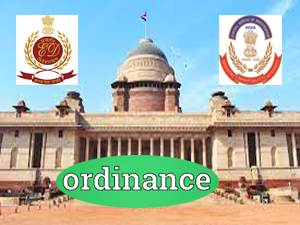TO RECIEVE EXCLUSIVE POSTS AND NEWS
Must Read
‘Maximum five years term’ for ED & CBI chiefs: A political tale of two ordinances
By IndianMandarins- 14 Nov 2021
1823New Delhi (15.11.2021): On the birthday, November 14, of India's first PM Pt. Jawahar Lal Nehru, the NDA administration came up with two new ordinances that amend the CVC Act 2003 as well as the Delhi Special Police Establishment Act. The new amendments empower the executive to raise the mandatory two-year term for the ED and CBI chiefs to five years at one go or in phase depending on its convenience. The amended CVC Act is seen in the official and judicial circles as a legal ploy used for extending the term of ED chief Sanjay Kumar Mishra (IRS IT:1984) beyond November 18, 2021. As pointed out in an earlier story on Mishra in Indianmandarins on November 14, the government found the issue of extending Mishra's term a bit complicated because of the Supreme Court intervention in the case of his earlier extension and making it clear that he shouldn't be given any further extension. So, probably, to bypass the obstacle created by the SC ruling, the government is said to have promulgated the new Ordinance of November 14 to push and implement its project or idea of extending Mishra's term on the cover that it is also extending the same rule to the CBI too, where, of course, there is no immediate necessity for the government to apply the ordinance. Effectively, the government may argue that it hasn't exclusively amended CVC Act and that it has felt the necessity to amend both the CVC Act and the Delhi Special Police Establishment Act 1946 to ensure continuity of their leadership as when the occasion arises. It must be admitted, though, that at the moment there is no evidence as such that the new ordinance has been promulgated for rewarding an old loyalist of the NDA administration. As the saying goes, it hasn't happened till it has happened. So let's wait and watch whether Mishra gets the benefit of the amended CVC Act on November 18. If he does get the benefit, the administration would have spilled the beans in public, and famous or infamous litigants may again knock at the SC door. If he doesn't get the benefit, then there may be nothing much left to suspect the government's intent. Surely, the opposition parties may make a lot of noise on this latest ordinance as they did on earlier ordinances in view of the winter session of Parliament a fortnight away for commencement. But they will be hugely short on ordnance to rip apart the government. That is because the previous successive administrations had really set worse precedents. If a much-celebrated democrat like Nehru loved to rule by decrees and fiats through Ordinances as pointed out at the beginning of this analytical report, so what's wrong, the ruling party could very well argue, if the NDA administration has indulged in a few ordinances. Indeed, data from the Legislative Branch of the Ministry of Law and Justice may be used to counter and decimate opposition talking points on the issue. They indicate that between 1952-2014, governments issued 637 ordinances which averages 11 per year. Of these, 456 were issued in about 50 years of Congress rule covering six Prime Ministers. The data also show that Indira Gandhi issued 77 Ordinances during 1971-77. This translates into a rate of almost three ordinances every two months. The following are the features of the new Ordnance/Amendment called CVC (Amendment) Ordinance, 2021 (dated 14.11.2021): In section 25 of the CVC Act 2003, in clause (d), the following provisions shall be inserted, namely:- “Provided that the period for which the Director of Enforcement holds the office on his initial appointment may, in the public interest, on the recommendation of the Committee under clause (a) and for the reasons to be recorded in writing, be extended up to one year at a time. Provided further that no such extension shall be granted after the completion of a period of five years in total including the period mentioned in the initial appointment” Similarly, the following insertions have been made through the Delhi Special Police Establishment (Amendment) Ordinance, 2021: In Section 4B of the Delhi Special Police Establishment Act 1946, in sub-section (1), the following provisions shall be inserted, namely:- ‘Provided that the period for which the Director holds the office on his initial appointment may, in the public interest, on the recommendation of the committee under the sub-section (1) of section 4A and for the reasons to be recorded in writing, be extended up to one year at a time: Provided further that no such extension shall be granted after the completion of a period of five years in total including the period mentioned in the initial appointment’ (By Rakesh Ranjan) ALSO READ: Administration seeks legal advice on retaining ED chief on contract (14.11.2021)
- News Analysis
- Bureaucracy News
- Judiciary news
- Exclusive News
- CBI
- CBI Director
- Enforcement Directorate
- Directorate of Enforcement
- Central Bureau of Investigation
- SK Mishra IRS
- S K Mishra IRS
- Sanjay Kumar Mishra
- Sanjay Kumar Mishra IRS
- Subodh Kumar Jaiswal
- S K Jaiswal IPS
- Ordinance
- CVC Act 2003
- NDA administration
- Jawahar Lal Nehru Port
- Delhi Special Police Establishment Act
Readers' Choice
Clean chit to IPS officers: CAT holds RCB’s social media adventurism responsible for stampede 43 minutes ago
R K Sharma is the new Rajasthan DGP 30 Jun 2025
Centre swings surprise, Gujarat DGP gets extension in service 30 Jun 2025
Tenure of Chhattisgarh Chief Secretary extended 30 Jun 2025
Rajesh Kumar appointed as Chief Secretary of Maharashtra 30 Jun 2025
‘Maximum five years term’ for ED & CBI chiefs: A political tale of two ordinances
By IndianMandarins - 2021-11-14 22:11:00

New Delhi (15.11.2021): On the birthday, November 14, of India's first PM Pt. Jawahar Lal Nehru, the NDA administration came up with two new ordinances that amend the CVC Act 2003 as well as the Delhi Special Police Establishment Act. The new amendments empower the executive to raise the mandatory two-year term for the ED and CBI chiefs to five years at one go or in phase depending on its convenience.
The amended CVC Act is seen in the official and judicial circles as a legal ploy used for extending the term of ED chief Sanjay Kumar Mishra (IRS IT:1984) beyond November 18, 2021. As pointed out in an earlier story on Mishra in Indianmandarins on November 14, the government found the issue of extending Mishra's term a bit complicated because of the Supreme Court intervention in the case of his earlier extension and making it clear that he shouldn't be given any further extension.
So, probably, to bypass the obstacle created by the SC ruling, the government is said to have promulgated the new Ordinance of November 14 to push and implement its project or idea of extending Mishra's term on the cover that it is also extending the same rule to the CBI too, where, of course, there is no immediate necessity for the government to apply the ordinance. Effectively, the government may argue that it hasn't exclusively amended CVC Act and that it has felt the necessity to amend both the CVC Act and the Delhi Special Police Establishment Act 1946 to ensure continuity of their leadership as when the occasion arises.
It must be admitted, though, that at the moment there is no evidence as such that the new ordinance has been promulgated for rewarding an old loyalist of the NDA administration. As the saying goes, it hasn't happened till it has happened. So let's wait and watch whether Mishra gets the benefit of the amended CVC Act on November 18. If he does get the benefit, the administration would have spilled the beans in public, and famous or infamous litigants may again knock at the SC door. If he doesn't get the benefit, then there may be nothing much left to suspect the government's intent.
Surely, the opposition parties may make a lot of noise on this latest ordinance as they did on earlier ordinances in view of the winter session of Parliament a fortnight away for commencement. But they will be hugely short on ordnance to rip apart the government. That is because the previous successive administrations had really set worse precedents. If a much-celebrated democrat like Nehru loved to rule by decrees and fiats through Ordinances as pointed out at the beginning of this analytical report, so what's wrong, the ruling party could very well argue, if the NDA administration has indulged in a few ordinances.
Indeed, data from the Legislative Branch of the Ministry of Law and Justice may be used to counter and decimate opposition talking points on the issue. They indicate that between 1952-2014, governments issued 637 ordinances which averages 11 per year. Of these, 456 were issued in about 50 years of Congress rule covering six Prime Ministers. The data also show that Indira Gandhi issued 77 Ordinances during 1971-77. This translates into a rate of almost three ordinances every two months.
The following are the features of the new Ordnance/Amendment called CVC (Amendment) Ordinance, 2021 (dated 14.11.2021):
In section 25 of the CVC Act 2003, in clause (d), the following provisions shall be inserted, namely:-
“Provided that the period for which the Director of Enforcement holds the office on his initial appointment may, in the public interest, on the recommendation of the Committee under clause (a) and for the reasons to be recorded in writing, be extended up to one year at a time.
Provided further that no such extension shall be granted after the completion of a period of five years in total including the period mentioned in the initial appointment”
Similarly, the following insertions have been made through the Delhi Special Police Establishment (Amendment) Ordinance, 2021:
In Section 4B of the Delhi Special Police Establishment Act 1946, in sub-section (1), the following provisions shall be inserted, namely:-
‘Provided that the period for which the Director holds the office on his initial appointment may, in the public interest, on the recommendation of the committee under the sub-section (1) of section 4A and for the reasons to be recorded in writing, be extended up to one year at a time:
Provided further that no such extension shall be granted after the completion of a period of five years in total including the period mentioned in the initial appointment’
(By Rakesh Ranjan)
ALSO READ:
Administration seeks legal advice on retaining ED chief on contract (14.11.2021)






























